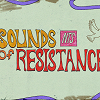Personalised Recommendations
Sign up or log in to MY NTS and get personalised recommendations
Unlock Live Tracklists
Support NTS for timestamps across live channels and the archive
Live on 1

Sounds Of Resistance: Editions Syliphone Conakry
A special hour on Editions Syliphone Conakry, the Guinean state-funded record label that ran from 1967 to 1986, across the tenure of President Sékou Touré. The purpose of the label was to support and promote Guinean traditional and national music, at home and abroad.
Since its independence from France in 1958, Guinea's artists had been radicalised by an official cultural policy that sought to modernise the arts while still being faithful to the traditional roots. It was a policy called authenticité, and music was its prime focus. Under the policy each region in Guinea, some 34 in total, were represented by artistic troupes. These consisted of an orchestra, a traditional music ensemble, a choir, and a theatrical group. The government purchased new musical instruments for the orchestras, at a huge cost, and encouraged the groups to write songs about topics such as African nationalism, anti-colonialism, and anti-imperialism.
The Syliphone label thus captured a moment in African history when a new nation asserted its voice and placed music at the forefront of its cultural identity. Their’s is a story that is intertwined with the political struggle for independence in Africa.
You Might Also Like
Tracklist
- Les Ballets AfricainsM'balia Camara
- Papa Diabaté & Sekou DiabatéSolos De Guitare
- Kada DiawaraMane Magni
- Sory Kandia KouyatéDouga
- Ensemble Instrumental De La Radiodiffusion NationaleNaissance De L'O.E.R.S.
- Orchestre De La PailloteKadia Blues
- Balla Et Ses BalladinsSakhodougou
- Aboubacar Demba Camara & Son GroupeExhumation Folklorique (Tentemba)
- Bembeya - Jazz NationalBeni Ibara
- Keletigui Et Ses TambourinisManghoya
- Orchestre PailloteDiaraby
- Camayenne SofaKögnö Koura
- Bembeya Jazz NationalAlalake
- Orchestre Du Jardin De GuineeBandian
- Keletigui Et Ses TambourinisSoundiata
- Balla Et Ses BalladinsSara "70"
- Bembeya JazzRegard Sur Le Plusse
- Horoya Band NationalZoumana
- Franklin Boukaka, Keletigui Et Ses TambourinisM'Bongi Eyi
- Orchestre De La Garde Républicaine (2ème Formation)Kairaba
- Camayenne SofaKönönin
- Bembeya Jazz NationalWaraba
- Camayenne SofaDjumaba
- Balla Et Ses BalladinsMoi Ça Ma Fout

